- Home
- Gayle Forman
Just One Day Page 37
Just One Day Read online
Page 37
Page 37
“Okay. ” I pull out my Paris phone, and we exchange numbers. “You never told me your name, by the way?”
He laughs at that. “No, I didn’t. I am Modou Mjodi. And I never learned your name. I looked on the suitcase but there was nothing. ”
“I know. My name is Allyson, but Céline will know me as Lulu. ”
He looks perplexed. “Which is correct?”
“I’m beginning to think they both are. ”
He shrugs a little, takes my hand, kisses my cheeks twice, and then he bids me adieu.
It’s only lunchtime when I leave Modou, and with no idea when I will see Céline, I feel oddly relieved, like I’ve been given a reprieve. I hadn’t really planned on being a tourist in Paris, but I decide to do it. I brave the Metro and get off in the Marais quarter and go to one of the cafés along the beautiful Place des Vosges, where I order a salad and a citron pressé, adding plenty of sugar this time. I sit there for hours, waiting for the waiter to kick me out, but he leaves me alone until I ask for my check. At a patisserie, I get a ridiculously expensive macaron—this one a pale tangerine, like the last whispers of a sunset. I eat it and walk, in and out of the narrow streets, through a lively Jewish section, full of Orthodox men with black hats and stylish skinny suits. I snap a few pictures for my mom and text them to her and tell her to forward them to Grandma, who’ll get a kick out of it. Then I wander around looking at the boutiques, gazing at clothing I can barely afford to touch. When the salesladies ask me in French if I need help, I answer in French that I am just browsing.
I buy some postcards and go back to Place des Vosges and sit down in the park inside the square. Amid the mothers playing with their babies and the old men reading their newspapers, puffing away on cigarettes, I write them out. I have a lot to send. One to my parents, one to my grandmother, one to Dee, one to Kali, one to Jenn, one to Café Finlay, one to Carol. And then, at the last minute, I decide to write one to Melanie too.
It’s kind of a perfect day. I feel totally relaxed, and though I’m undoubtedly a tourist, I also feel like a Parisian. I’m almost relieved that I haven’t heard from Modou. Kelly sends me a text about meeting up for dinner, and I’m getting ready to make my way back to the hostel when my phone chirps. It’s from Modou. Céline will be at the club after ten o’clock.
I feel like the mellow relaxing vibe of the afternoon disappears behind a storm cloud. It’s only seven. I have several hours to kill, and I could go meet the Oz gang for dinner, but I’m too nervous. So, I walk the city in my nervousness. I get to the club at nine thirty and stand outside, the heavy bass thump of live music making my heart pound. She’s probably already there, but it feels like being early is some kind of faux pas. So I linger outside, watching the stylishly edgy Parisians with razored haircuts and angular clothes filter into the club. I look down at myself: khaki skirt, black T-shirt, leather flip-flops. Why didn’t I dress for battle?
At ten fifteen, I pay my (ten-euro) entry and go in. The club is packed, and there’s a band on the stage, all heavy guitars and a violin screeching feedback, and the tiniest Asian girl singing in this high, squeaky voice. All alone, surrounded by these hipsters, I don’t think I’ve ever felt so out of place, and every part of me is telling me to leave before I make a fool of myself. But I don’t. I haven’t come this far to chicken out. I fight my way to the bar, and when I see Modou, I greet him like a long-lost brother. He smiles at me and pours me a glass of wine. When I try to pay, he waves the bill away, and immediately, I feel better.
“Ahh, Céline is there,” he says, pointing to a table up front. She sits, alone, watching the band with a strange intensity, the smoke from her cigarette curling witchily around her.
I walk over to her table. She doesn’t acknowledge me, though I can’t tell if it’s because she’s snubbing me or concentrating on the band. I stand next to the open chair waiting for her to invite me to sit down, but then I just give up. I pull the chair out and sit. She gives me the slightest of nods, takes a puff of the cigarette, and blows smoke all over me, which I suppose counts as a greeting. Then she turns back to the band.
We sit there, listening. We are sitting right up close to the speakers, so the sound is extra deafening; my ears are already beginning to ring. It’s hard to tell if she’s enjoying the music. She doesn’t tap her toes or sway or anything. She just stares and smokes.
Finally, when the band takes a break, she looks at me. “Your name is Allyson. ” She pronounces it Aleeseesyoohn, which makes it sound ridiculous somehow, an SUV of an American name with too many syllables.
I nod.
“So, not French at all?”
I shake my head. I never claimed it was.
We stare at each other, and I realize she won’t give me a thing. I have to take it. “I’m looking for Willem. Do you know where I can find him?” I’d meant to come in guns blazing, French spouting, but my nerves have sent me scurrying back to the comforts of my mother tongue.
She lights a new cigarette and blows more smoke on me. “No. ”
“But, but he said you were good friends. ”
“He said that? No. I am just like you. ”
I cannot imagine in what way she would think she is even remotely like me, aside from us both possessing two X chromosomes. “How, how are we anything alike?”
“I am just one of the girls. There are many of us. ”
It’s not like I didn’t know this about him. Not like he hid it. But hearing it out loud, from her, I feel exhausted, jet lag dropping me like a plummeting elevator.
“So you don’t know where he is?”
She shakes her head.
“And you don’t know where I can find him?”
“No. ”
“And would you even tell me if you did?”
Her eyebrow goes up into that perfect arch as smoke curls out of her mouth.
“Can you even tell me his last name? Can you tell me that much?”
And here she smiles. Because in this little game we are playing, have been playing since last summer, I just showed my hand. And what a rotten hand it is. She takes a pen and a scrap of paper and writes something down. She slides the paper over to me. His name is on there. His full name! But I won’t give her the satisfaction of my eagerness, so I casually tuck it in my pocket without even glancing at it.
“Do you need anything else?” Her tone, haughty and gloating, manages to carry over the sounds of the band, who have started playing again. I can already hear her laughing about me with all her hipster pals.
“No, you’ve done quite enough. ”
She eyes me for a long second. Her eyes aren’t so much blue as violet. “What will you do now?”
I force a bitchy smile, which I expect doesn’t look bitchy so much as constipated. “Oh, you know, see the sights. ”
She blows more smoke on me. “Yes, you can be a touriste,” she says, as though tourist were an epithet. Then she begins ticking off all the places lowly people like us go. The Eiffel Tower. Sacré-Coeur. The Louvre.
I search her face for hidden meaning. Did he tell her about our day? I can just picture them laughing about me throwing the book at the skinheads, telling Willem I’d take care of him.
Céline is still talking about all the things I can do in Paris. “You can go shopping,” she is saying. Buy a new handbag. Some jewelry. Another watch. Some shoes. I can’t quite fathom how someone spouting off Ms. Foley–like advice can be so condescending.
“Thank you for your time,” I say. In French. Annoyance has made me bilingual.
Thirty-one
Willem de Ruiter.
His name is Willem de Ruiter. I rush to an Internet café and start Googling him. But Willem de Ruiter turns out to be a popular name in Holland. There’s a Dutch cinematographer with that name. There’s some famous diplomat with that name. And hundreds of other nonfamous people who nevertheless have some reason to be on the
Internet. I go through hundreds of pages, in English, in Dutch, and I find not one link to him, not one piece of evidence that he actually he exists. I Google his parents’ names Bram de Ruiter. Yael de Ruiter. Naturopath. Actor. Anything I can think of. All these combinations. I get vaguely excited when some weird theater thing comes up, but when I click through, the website is down.
How can it be this hard to find someone? It occurs to me that maybe Céline intentionally gave me the wrong name.
But then I Google myself, “Allyson Healey,” and I don’t come up, either. You have to add the name of my college before you get my Facebook page.
I realize then it’s not enough to know what someone is called.
You have to know who they are.
Thirty-two
The next morning, Kelly and her friends ask me if I want to join them for a trip to the Rodin Museum, followed by some shopping. And I almost say yes. Because that’s what I would like. But there is still one more stop. It’s not even that I think I’ll find anything; it’s just that, if I’m facing down demons, I have go to there too.
I’m not sure where it is, exactly, but I do know the intersection where Ms. Foley had me picked up. It is seared into my brain. Avenue Simon Bolivar and Rue de l’Equerre, the cross streets of Humiliation and Defeat.
When I get out of the Metro, nothing seems familiar. Maybe because the last time I was here, I was flipping out in such a panic. But I know I didn’t run that far before finding the pay phone, so I know it can’t be that far to the art squat. I methodically go up one block. Down the next. Up and back. But nothing seems familiar. I attempt to ask directions, but how do you say “art squat” in French? Old building with artists? That doesn’t work. I remember the Chinese restaurants in the vicinity and ask for them. One young guy gets really excited and, I think, offers a recommendation to one supposedly good place across on Rue de Belleville. I find it. And from there, I find a sign for double happiness. It could be one of many, but I have a feeling it’s the one.
I wander around for fifteen more minutes and, on a quiet triangle of streets, find the squat. It has the same scaffolding, same distorted portraits, maybe a little more weather-beaten. I knock on the steel door. No one answers, but there are obviously people inside. Music wafts out from the open windows. I give the door a push. It creaks open. I push it farther. I walk inside. No one pays me any notice. I go up the creaking staircase, to the place where it all happened.
I see the clay first, bright white, yet at the same time, golden and warm. Inside, a man is working. He is petite, Asian, a study in contrasts: His hair white with black roots, his clothes all black and strangely antiquated, like he stepped out of a Charles Dickens novel, and all covered in the same white dust that covered me that night.
He is carving at a piece of clay with a scalpel, his attention so focused I’m afraid he’ll startle with the merest sound. I clear my throat and knock quietly on the door.
He looks up and rubs his eyes, which are bleary with concentration. “Oui. ”
“Bonjour,” I begin. And then I sputter. My limited French is no match for what I need to explain to him. I crashed your squat, with a guy. I had the most intimate night of my life, and I woke up utterly alone. “Umm, I’m looking for a friend who I think you might know. Oh, I’m sorry—parlez-vous anglais?”
He lifts his head and nods, slightly, with the delicacy and control of a ballet dancer. “Yes,” he says.
“I’m looking for a friend of mine, and I wonder if you might know him. His name is Willem de Ruiter. He’s Dutch?” I watch his face for a flicker of recognition, but it remains impassive, as smooth as the clay sculptures that surround us.
“No? Well, he and I stayed here one night. Not exactly stayed here . . . ” I trail off, looking around the studio, and it all comes back to me: the smell of the rain against the thirsty pavement, the swirl of dust, the smooth wood of his worktable pressing into my back. Willem towering over me.

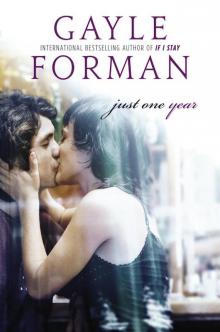 Just One Year
Just One Year If I Stay
If I Stay Where She Went
Where She Went Sisters in Sanity
Sisters in Sanity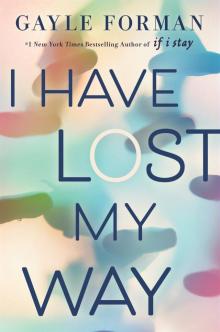 I Have Lost My Way
I Have Lost My Way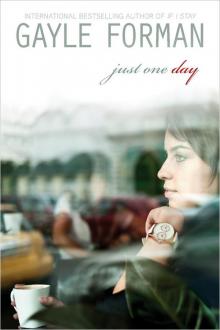 Just One Day
Just One Day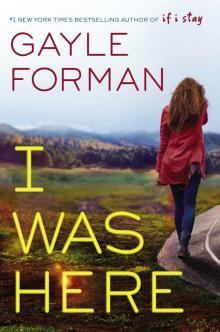 I Was Here
I Was Here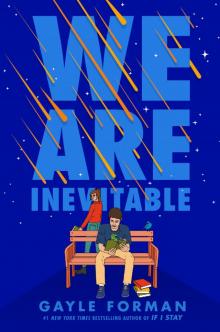 We Are Inevitable
We Are Inevitable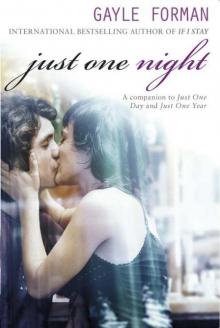 Just One Night
Just One Night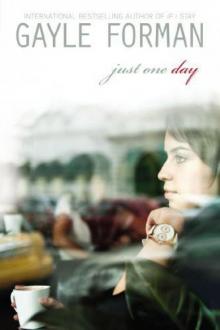 Just One Day jod-1
Just One Day jod-1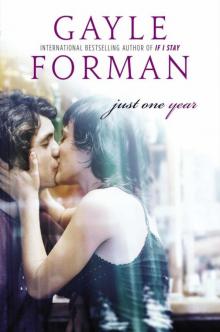 Just One Day 02: Just One Year
Just One Day 02: Just One Year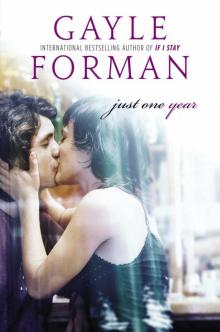 Just One Year jod-2
Just One Year jod-2